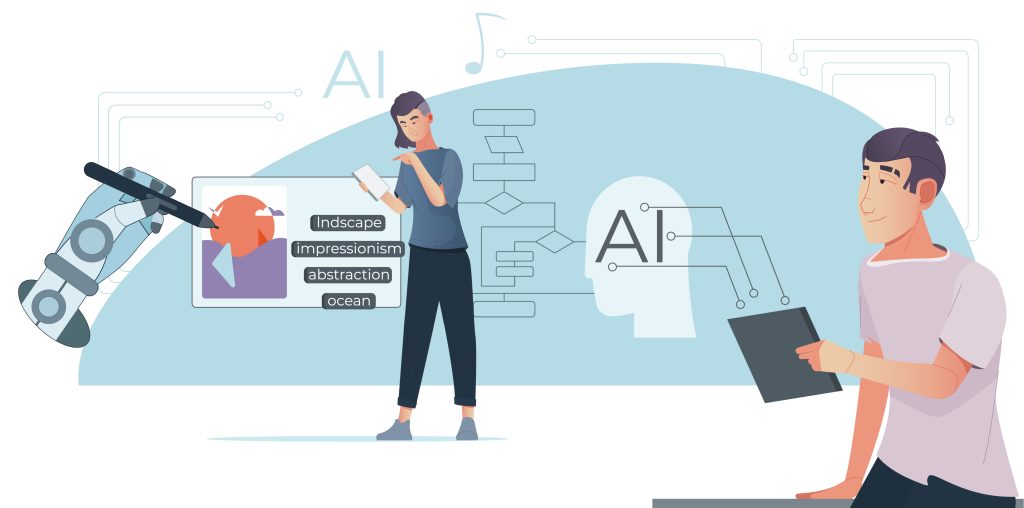Startups can unleash a secret weapon against larger corporations: AI-powered content creation. While big companies have the budget for expansive marketing teams, startups can leverage AI tools to create high-quality, relevant content that punches above its weight.
AI can be a game-changer for startup content creation. It automates repetitive tasks like keyword research and formatting, freeing up your limited resources for strategic aspects like brand voice and storytelling.
Additionally, AI analyzes audience data to personalize content, fostering deeper connections and boosting engagement. By embracing AI, startups can overcome resource limitations and create content that rivals, or even surpasses larger corporations.
What AI Tools are Available for Content Creation?

Various AI tools like OpenAI’s GPT, Grammarly, and Crayon offer solutions for writing, editing, and market analysis. These tools can help startups produce written content, graphics, and videos that resonate with their audience. They streamline the creative process, making it possible to produce more content with fewer people.
But AI content creation tools are still under development, and it’s important to remember that they shouldn’t replace human creativity entirely. AI excels at handling repetitive tasks, generating ideas, and providing data-driven insights. However, the human touch is still essential for crafting compelling content that aligns with the brand voice, evokes emotions, and resonates with a specific audience.
The most effective approach involves leveraging AI to augment human creativity, not replace it. This way, startups can produce high-quality, engaging content that achieves their goals.
How Can AI Improve Content Personalization?
AI can analyze user data to create personalized content strategies. By understanding user behaviors, preferences, and engagement patterns, AI technologies can help startups tailor their content. This means that startups can deliver more relevant and engaging content to different segments of their audience, improving user experience and loyalty.
AI can also automate the content personalization process. AI can analyze vast amounts of data and identify patterns that humans might miss. This allows AI to automatically personalize content elements, such as headlines, product recommendations, and calls to action, in real-time based on individual user behavior. This level of automation frees up marketers to focus on more strategic tasks, such as developing new content ideas and measuring the effectiveness of campaigns.
Finally, AI can continuously improve content personalization efforts. AI can track the performance of personalized content and use that data to refine its algorithms over time. This means that AI can continually learn and improve its ability to deliver content that resonates with individual users.
What Are the Costs of Implementing AI in Content Creation?

While initial costs may seem high, AI implementation in content creation is becoming more affordable. Many AI tools offer scalable pricing models, making them accessible to startups. The return on investment can be significant, as AI-driven content creation can lead to increased engagement, higher conversion rates, and more efficient use of resources.
However, it’s important to remember that AI is a tool and not a replacement for human creativity. The best content often comes from a collaboration between AI and human creators. AI can handle the heavy lifting of research, data analysis, and content generation at scale, while humans can focus on strategic aspects like brainstorming ideas, injecting brand voice and personality, and ensuring the content resonates with the target audience. This synergy between AI and human expertise is what will ultimately drive the most successful AI-powered content creation strategies.
How Can Startups Measure the Success of AI-driven Content?
Success can be measured through analytics tools that track engagement rates, conversion rates, and audience growth. AI can also provide insights into content performance, helping startups refine their strategies. By setting clear objectives and monitoring KPIs, startups can ensure their AI-driven content creation efforts are fruitful.
Here’s another way to measure success: human review and quality checks. While AI can be a powerful tool for generating content, it’s important to remember it’s not a replacement for human expertise. Regularly reviewing AI-generated content for accuracy, brand voice, and overall quality ensures that the content resonates with your target audience and achieves your desired outcomes. This human oversight can also identify areas where the AI can be further improved for future content creation.
To discover more about Google’s approach to AI workflow automation in content creation, read our pillar article. Dive deeper to learn how these innovative practices can be applied to your startup’s content strategy.
- Blockchain-Enabled IoT Device Authentication - October 16, 2024
- Quantum Cryptography: The Future of Secure Communication - October 9, 2024
- Photon Mapping for Enhanced Ray Tracing - October 2, 2024
